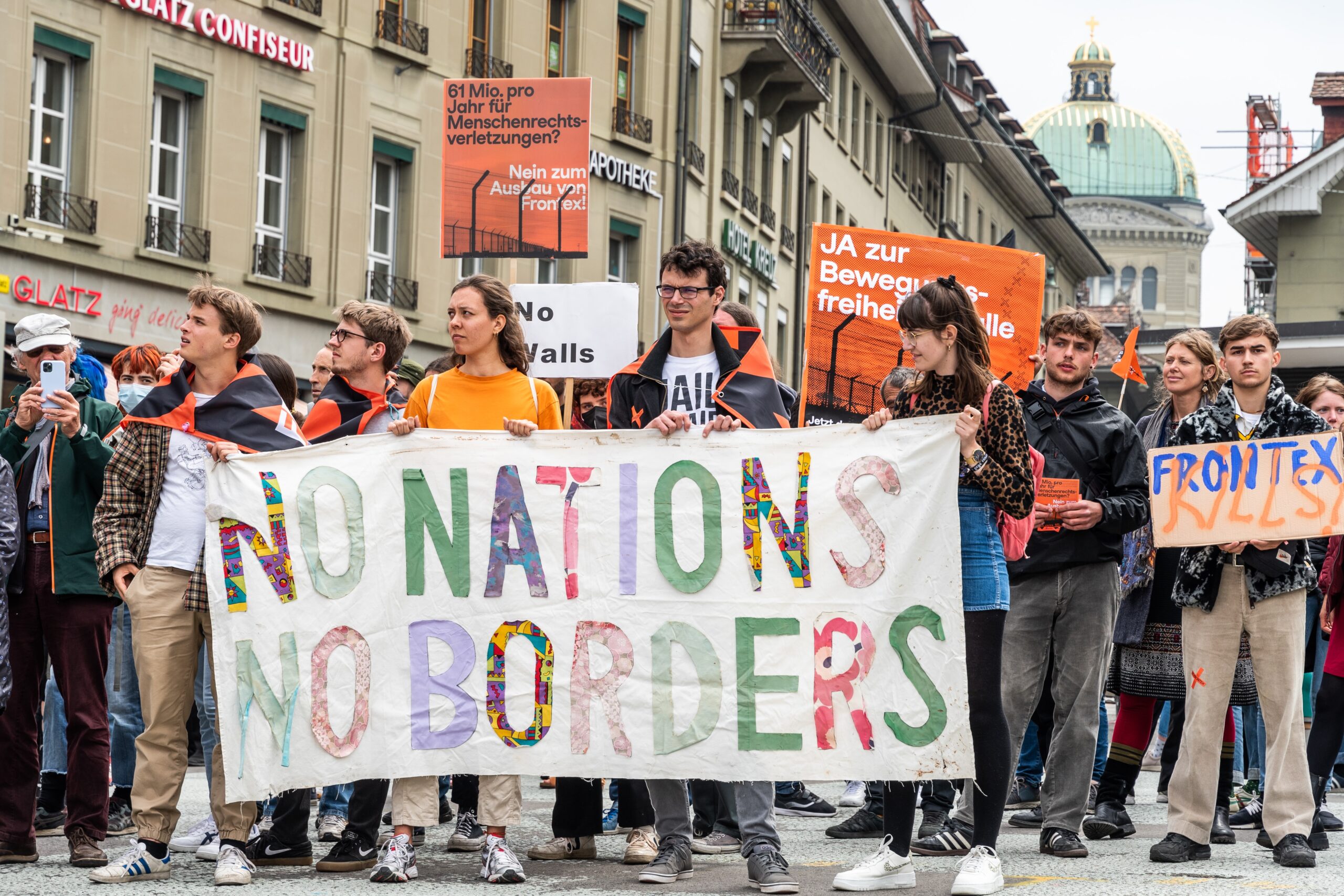Research > Migration & Global Collaboration
Migration & Global Colloboration
To address the challenges of the future, global collaboration will take centre stage. The biggest challenges can only be addressed when countries work together—challenges including the environment and global health, as well as development, stability and global prosperity. Europe has been at the forefront of multilateralism, resisting attempts by the Trump administration to challenge collaboration in many areas on the world stage. The global standing of the EU and its longer-term strategy are at a critical juncture, with old alliances being called into question, while at the same time new opportunities are arising in Asia, and new challenges in the Global South. Issues that fall in this research area comprise migration, global conflict, strategic partnership and global collaboration.
Global Migration Information Hub
The Global Migration Information Hub (GMIH) is a knowledge hub for information and expertise on issues related to migration that are of public and policy importance, achieved through the production of first-rate research on migration-related topics.
Projects

Globalisation, Innovation and Population Health: The health impacts of economic changes to the labour market
This project aims to draw a detailed picture of how important economic trends such as globalisation and technological change have shaped public health over the past decades, in particular through the ways they have affected the labour market. These broad economic forces have changed the way that people work, shifting the occupational health hazards faced by the workforce. This project will explore how these shifts in the economy and the labour market have affected population health and how individuals’ behaviours have changed in response. By combining a variety of data sources on health information, working conditions, and health-related behaviours, and using structural modelling techniques, we will describe how individuals make decisions about their occupation over the course of a lifetime, the ways in which health has been affected by these factors, and how this relates to other determinants of changing population health.
Project Participants:
Christian Dustmann (University College London)
Courtney Brell (University College London)

Globalisation and the Spread of Diseases
This project aims to draw a detailed picture of how important economic trends such as globalisation are affecting population health. The increasingly global economy has led to greater transmissibility of diseases around the world, with direct consequences for public health. The project will explore how increased trade and mobility between countries has allowed for increased transmission of diseases, and will focus on an especially critical health issue: bacterial resistance to antibiotics. The WHO considers this to be the next and most important health issue worldwide. This project will combine data on health, antibiotic resistance and economic indicators at the country level over many years. It will develop a multi-country model to evaluate the economic and health consequences of the spread of antibiotic resistance, and to determine how efficient policies can be implemented.

Knowledge Spillover and Individual Careers
Workers obtain skills not only through formal education and training, but also through learning by doing at the workplace. Such skill acquisition at the workplace may partly operate through learning from coworkers. However, evidence on knowledge spillover among co-workers is still inconclusive, and most existing evidence has focused on high-skilled workers. This project will produce the first study to provide direct micro-level evidence on knowledge spillover from well-trained workers (apprenticeship graduates) onto their lower skilled coworkers. The main part of the project focuses on knowledge spillover onto unskilled labour market entrants without formal qualifications, a group that is vulnerable to job loss and low labour market attachment. In an extension, the analysis will shift to other groups of workers whose skills are low or require updating, most notably immigrant workers (whose skills require adaptation to the host country labour market) or older workers (whose skills may have become obsolete due to technological change). Knowledge spillovers at the workplace have obvious important implications: in the presence of knowledge spillovers, the return to investment into training can be far larger than the sum of returns to trained workers.
Project Participants:
Christian Dustmann (University College London)
Uta Schönberg (University College London)

Globalisation, Welfare and Economic Espionage
Economic espionage is a pervasive phenomenon around the world with potentially dramatic effects on the welfare of affected nations. In the United States and Germany alone, the economic damages caused by this illicit activity are estimated to amount to around 400 billion dollars and 100 billion euros per year respectively. Besides harming the targeted countries, economic espionage may also generate substantial benefits for the perpetrating countries. Yet, despite its economic importance and frequent appearance in current public debates, there exists hardly any quantitative evidence on the effects of economic espionage on the economy and society at large.
This project addresses various related questions on the role of economic espionage. We will investigate how and to what extent economic espionage generates tangible benefits for the perpetrating country, using unique micro-level data that provide a full account of East Germany’s spying activities in the West during the Cold War period. We will also analyse how espionage-based international knowledge flows today affect productivity growth and innovation, relating changes in measurable outcomes such as sectoral TFP to changes in the presence of a country’s own nationals in other foreign economies. Third, we will collect novel data by including a topic module on industrial espionage in a large longitudinal employer survey in Germany, allowing us to conduct a comprehensive firm-level analysis of the prevalence, perception, and impact of industrial espionage in contemporary Germany.
Project Participants:
Adrian Lerche (Institute for Employment Research, Nuremberg)
Lukas Mergele (ifo Institute, Munich)
Erqi Ge (Sun Yat-sen University, Guangzhou)

International Migration in the European Union: Evidence from Linked Register Data
The current policy discussion in many countries is concerned with skills shortage or the lack of workers in an expanding list of key occupations. A potential solution to the shortages could be increased mobility of workers with the required skills, a goal that also featured prominently in motivation for the common EU labor market.
This project studies the mobility of workers across two EU countries, Austria and Germany. It exploits novel linked register data from social security administrations in Germany and Austria, which enables us to construct longitudinal information on employment spells and earnings in both countries. Thereby the data allows us to observe complete career profiles of individual workers who migrate from Austria to Germany or vice versa.
The findings from this project will contribute to a better understanding of the motives for migration, the consequences of moving on workers’ career outcomes, the impacts of economic shocks and welfare policies on migration flows, and information transmission via migrant networks.
By providing evidence on migrant careers from two countries, the project makes novel contributions to the literature that was traditionally studying international migration from the perspective of a single country. The findings will also complement existing research on internal migration within one country by pointing out differences between national and international migration.
Project Participants:
David Card (University of California, Berkeley)
Rudolf Winter-Ebmer (Johannes Kepler University Linz)
Wolfgang Frimmel (Johannes Kepler University Linz)

Workplace connections, migration, and firm quality: evidence from German reunification
Modern labor markets display substantial inequality across regions and along gender lines. One reason for that is a lack of information about labor market opportunities.
This project examines the role of informational friction. It consists of two closely related sub-projects, which assess whether pre-established social connections at the workplace can help bridge the informational gap about labor market opportunities and help reduce inequalities in labor market outcomes.
The project is set against the backdrop of persistent within-country differences between East and West Germany. The unexpected fall of the Iron Curtain in 1989 unified two vastly dissimilar economic systems and triggered extensive population movements. After an initial surge, East-West migration rapidly slowed down. This slowdown was despite continuing economic opportunities and well-being disparities, which are evident even 30 years after reunification. The project first examines how the social connections of East German workers with co-workers who migrated to West Germany earlier can provide information about labor market opportunities in West Germany and whether and how this information is used. It then addresses gender inequality, asking whether gender differences in network connections and how networks are used can explain disparities in labor market outcomes.
Project Participants:
Alexandra Spitz-Oener (Humboldt-Universität zu Berlin)

Migration and migration policies
According to data from the European Border and Coast Guard Agency (Frontex), 330,000 irregular border crossings were registered in 2022 – an increase of 64% from the previous year and the highest number recorded since 2016. This project aims to understand the forces that pull and push migrants toward Europe and how EU migration policies affect this process. It will explore the migration process toward Europe and how migration barriers and economic opportunities in destination and transit countries and the migration policies of European countries influence it.
We will first look at the migration process, from the country of origin to a destination country, focusing on the flows from African countries to Europe. To this end, we will estimate a structural dynamic model of location choice, which endogenizes the migration routes chosen by immigrants. The estimated model will help analyze the impact of counterfactual policies intended to manage migrants’ flows either at the EU border or in Africa. We will then focus on the final stage of these migration movements and evaluate the effectiveness of EU border policies on attempted entries by unauthorized immigrants, estimating the causal effect of EU policies on irregular inflows. The analysis will quantify deterrence and diversion effects at the external EU borders, informing the policy debate on the management of migrations from the EU’s Southern and Eastern borders.
The results of this project will contribute to the literature on migration decisions and migration flows and how these are shaped by the situation and policy decisions in transit and destination countries. They will also provide input for the design of welfare-enhancing migration and border policies in Europe.
Project Participants:
Jerome Adda (Bocconi University)
Giacomo Battiston (ROCKWOOL Foundation Berlin)
Francesco Fasani (University of Milan)

Integrated Labor Markets, Cross-Border Workers, and Wage Equalization
Economic theory suggests that unrestricted cross-border labour mobility could lead to migration flows and wage equalisation within labour markets. However, persistent wage differentials are observed in several integrated labour markets across regions, contributing significantly to the rise of cross-border workers. This trend is increasingly relevant in the European labor market, with recent estimates indicating about 1.4 million cross-border workers in the European Union's workforce. This project aims to explore the reasons behind the presence of perpetual disparities in wages and working conditions in integrated border regions and to understand the factors driving cross-border workers' decisions to live in one country while working in another. We first develop a new theoretical model to capture the dynamics of worker and firm behavior across two countries. We then empirically assess the factors that explain the observed patterns by examining detailed administrative data on workers and firms in the labor market between Switzerland and Italy, particularly focusing on the region of Ticino.
Project Participants:
Christian Dustmann (University College London)